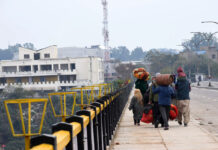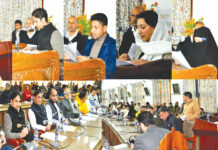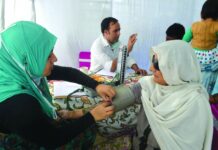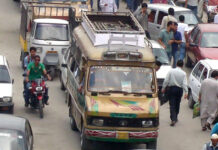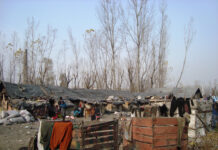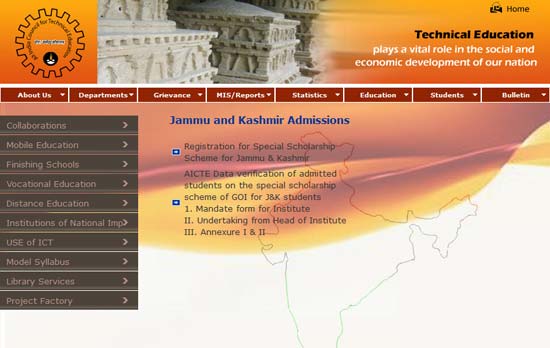A cursory examination of infrastructure and basic facilities available to government middle schools reveals a callous ignorance the system metes out to primary education in the state. Junaid Nabi Bazaz checked up a few schools in the capital city, Srinagar.
 We have no sanitation. We have to take children to nearby houses for using the toilet, and sometimes we are forced to take them back to their homes so they can use the bathroom.” This is what the In Charge of the Government Middle School at Jogilankar says about the extent of sanitation issues at her school.
We have no sanitation. We have to take children to nearby houses for using the toilet, and sometimes we are forced to take them back to their homes so they can use the bathroom.” This is what the In Charge of the Government Middle School at Jogilankar says about the extent of sanitation issues at her school.
This school is one out of 228 government middle schools of Srinagar where hygiene standards are appalling. The school in Jogilankar is running out of a rented building, which has no bathrooms or drinking water facilities, and according to the In Charge, these conditions force them to resort to uncomfortable alternatives. “Sometimes the neighbors don’t allow us to use their bathrooms. And we have no choice but to listen to them.”
The In Charge—who wishes to remain anonymous—says the school administration has approached government authorities on several occasions to plead their case. “The promises made to us were never fulfilled,” she says. The school building is in a poor condition, and according to the In Charge, it can come down any time. “Whenever a heavy vehicle passes by, the school building shakes—almost as if there is an earthquake taking place,” she says.
The glaring inadequacy at this school and others comes despite the fact that there is a government scheme to prevent such conditions. The Sarva Shikhsha Abhiyan (SSA) is a centrally-sponsored program meant for creating a uniform system of elementary education across India. The SSA aims to provide requirements across a broad spectrum in order to create sustainable education for children between the ages of 6 to 14. Additionally, according to the scheme, registered schools should have proper infrastructure to facilitate comfortable teaching.
But there are a significant number of schools in the Srinagar district that have no trace of the SSA being implemented.
The problem of proper sanitation echoes through the halls of many government middle schools in the Gulab Bagh area. A teacher of one such school says, “Recently an official from a non-governmental organization (NGO) had come here for some research. She wanted to use the bathroom, and we had no choice but to take her to a neighbor’s house for it. It was quite embarrassing.”
Officials from the government middle school in Zadibal, Hawwal say there should be proper planning before a school is constructed. Bilala Jan, the school In Charge, says her school was upgraded from a primary school to a middle school last year, but the basic facilities were still missing despite the upgrade. Bilala Jan’s school has also been the victim of what many see as internal politics.
 She says that the tenders for the construction of a bathroom were released a few months ago, but she alleges that the principal of the higher secondary school is creating hurdles. “He claims the middle school is a property of the higher secondary school.” The In Charge says, “the problem gets worse—at times we are not allowed to use the toilet and tap water by the Higher Secondary School principal.”
She says that the tenders for the construction of a bathroom were released a few months ago, but she alleges that the principal of the higher secondary school is creating hurdles. “He claims the middle school is a property of the higher secondary school.” The In Charge says, “the problem gets worse—at times we are not allowed to use the toilet and tap water by the Higher Secondary School principal.”
Different versions of the same story are seen across Srinagar, including at another government middle school in the Alamgari Bazaar area of Hawwal. This school has been in business for the past four years, but the sanitation conditions are just as bad as the others—in addition to several other problems that it has to deal with. According to the In Charge, the school just started construction work on some basic facilities a few weeks ago.
However, these were done with the help of the Zonal Education Officer (ZEO) when they should in fact be under the jurisdiction of the Public Health Engineering (PHE) department, according to the SSA guidelines. School officials say they approached the PHE repeatedly, but when there was no response, the school administration decided to take the taskon their own shoulders. “Now weeks have passed by, but we still don’t have a water connection. We’re thinking that we will also do that part of it ourselves,” the In Charge says.
Authorities of thisschool may have taken the initiative to improve conditions at their school, but the problem still remains. Although a bathroom has been constructed, the school still depends on the higher secondary school for support.
“It’s difficult for the sweepers and other cleaning staff to get water from far away for their routine cleaning and cooking duties,” says the In Charge.
Schools such as this one are facing problems on other fronts as well. Some have insufficient staff, while others have poor infrastructure. A common thread that ties all schools when it comes to infrastructure problems is the negligence in using funds for midday meals.
According to the SSA, these funds should get released twice a year. But according to the principals of several schools, these funds are never released on time.
Even when funds are released, they only get paid for a few months a year. The principals of these schools then are forced to run it on their own expenses.
One principal says, “I have to feed 125 students a day, which costs about Rs.5000 a month, and more than Rs.50,000 a year. But we do not get funds on time, and therefore we pay from our own pockets so that the students still get food.”
 According to the In Charge, the school does not have sufficient staff and therefore the teachers have to take additional classes, with which they are not able to give students quality education.
According to the In Charge, the school does not have sufficient staff and therefore the teachers have to take additional classes, with which they are not able to give students quality education.
“As per government orders, a middle school should have 12 staff members, but ours has only seven. This has affected our daily school performance. And when any staff member goes on leave, the problem increases,” says the principal of the school on condition of anonymity.
The principal of another middle school in Hawwal says they have the similar problems. “We have no windows and doors. And we do not get funds for construction on time,” says Yasmeen Jan.
Education officials say they guarantee a better future for these schools. The Chief Education Office (CEO) of Srinagar, Muhammad Javeed says, “We know these schools are having problems at several levels. Very soon we plan on going to these places to assess the problem.”
Regarding the midday meals issue, the CEO said, “As per the scheme, the fund are not released unless the district furnishes full details about the cost of expenditure. And that’s why there’s a delay. We are in direct contact with the zonal heads and the problems will be streamlined soon.”
Administration officials from most government schools say they have repeatedly tried to contact the State Education Minister to enhance the basic education system across Jammu and Kashmir. But they say they’re still waiting for promises to be fulfilled.


